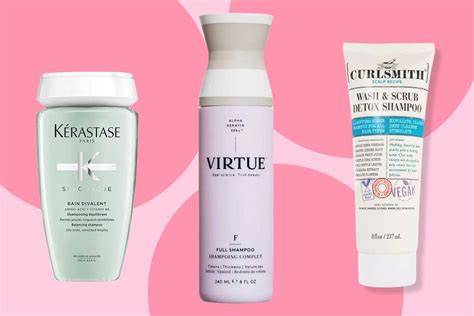If you’re struggling with a greasy scalp but dry hair, you’re not alone. This common hair issue can be frustrating to deal with, but thankfully, there are several effective ways to manage it.

Causes of Greasy Scalp and Dry Hair
Understanding the causes of your hair issues is the first step in finding the best shampoo.
Greasy Scalp
- Overactive sebaceous glands: The sebaceous glands produce oil to lubricate the hair and scalp. When these glands become overactive, they can produce too much oil, resulting in a greasy scalp.
- Hormonal changes: Androgens, hormones that are produced in both men and women, can stimulate the sebaceous glands and increase oil production.
- Diet: A diet high in processed foods, sugar, and unhealthy fats can contribute to a greasy scalp.
- Stress: Stress can trigger hormonal changes that lead to increased oil production.
Dry Hair
- Lack of moisture: Dry hair lacks moisture, which can be caused by factors such as exposure to heat, wind, and sun, as well as chemical hair treatments.
- Damaged hair: Damaged hair has a compromised cuticle, which prevents moisture from being retained.
- Genetics: Some people are naturally more prone to dry hair than others.
- Environmental factors: Extreme temperatures, humidity, and pollution can all contribute to dry hair.
Choosing the Right Shampoo
When choosing a shampoo for greasy scalp and dry hair, it’s important to look for products that are:
- Balancing: Shampoos with balancing ingredients help regulate oil production and moisturize dry hair.
- Clarifying: Clarifying shampoos remove excess oil and buildup from the scalp.
- pH-balanced: Shampoos with a pH between 4.5 and 5.5 are gentle on the hair and scalp.
- Avoid sulfates: Sulfates are harsh detergents that can strip the hair of its natural oils, exacerbating dryness.
Best Shampoos for Greasy Scalp and Dry Hair
1. Neutrogena Anti-Residue Shampoo
- Key ingredients: Clarifying surfactants, sodium laureth sulfate
- Benefits: Effectively removes excess oil and buildup, leaving hair feeling clean and light.
2. Paul Mitchell Shampoo Two
- Key ingredients: Balancing surfactants, panthenol
- Benefits: Cleanses the scalp while moisturizing and conditioning dry hair.
3. Aveda Be Curly Shampoo
- Key ingredients: Curl-enhancing botanicals, coconut oil
- Benefits: Defines and enhances curls while providing moisture and hydration.
4. Moroccanoil Hydrating Shampoo
- Key ingredients: Argan oil, avocado oil
- Benefits: Hydrates and nourishes dry hair while gently cleansing the scalp.
Tips and Tricks
- Wash less frequently: Over-washing can strip the hair of its natural oils, leading to dryness. Aim to wash your hair 2-3 times per week.
- Use lukewarm water: Hot water can damage hair and scalp.
- Apply conditioner to the ends only: Conditioner can weigh down greasy roots, so focus on applying it to the ends of your hair.
- Use a leave-in conditioner: Leave-in conditioners provide extra moisture without weighing down the hair.
- Use dry shampoo: Dry shampoo can help absorb excess oil between washes.
- Avoid overusing styling products: Styling products can build up on the scalp and contribute to greasiness.
- Protect your hair from heat: Heat from hair dryers and styling tools can damage and dry out hair. Use a heat protectant spray to minimize damage.
- Get regular trims: Regular trims remove split ends and help promote healthy hair growth.
Pros and Cons
Pros:
- Effectively cleanses greasy scalp and moisturizes dry hair
- Balances oil production
- Improves hair health and appearance
- Convenient and easy to use
Cons:
- May not be suitable for all hair types
- Some shampoos may contain harsh ingredients
- Can be expensive
- May require trial and error to find the right product
FAQs
1. What causes greasy scalp and dry hair?
Greasy scalp can be caused by overactive sebaceous glands, hormonal changes, diet, and stress. Dry hair is typically caused by a lack of moisture, damage, genetics, or environmental factors.
2. What ingredients should I look for in a shampoo for greasy scalp and dry hair?
Look for shampoos with balancing ingredients, clarifying surfactants, and a pH between 4.5 and 5.5. Avoid shampoos with sulfates.
3. How often should I wash my hair with a shampoo for greasy scalp and dry hair?
Aim to wash your hair 2-3 times per week to avoid over-drying.
4. Can I use conditioner with a shampoo for greasy scalp and dry hair?
Yes, but only apply conditioner to the ends of your hair to avoid weighing down the roots.
5. What other products can I use to manage greasy scalp and dry hair?
Leave-in conditioners, dry shampoos, and hair masks can help moisturize dry hair and absorb excess oil.
6. Is it possible to prevent greasy scalp and dry hair?
Managing stress levels, maintaining a healthy diet, and protecting your hair from heat can help prevent greasy scalp and dry hair.
7. When should I see a dermatologist about greasy scalp and dry hair?
If you have tried several shampoos and treatments without success, or if you experience severe symptoms, consult a dermatologist for further evaluation and treatment options.
8. Are there any over-the-counter medications that can help with greasy scalp and dry hair?
Ketoconazole shampoo, an antifungal medication, can help reduce oil production.
